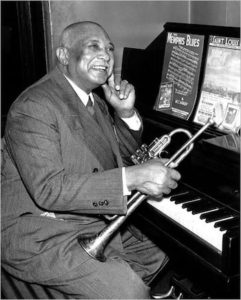
W. C. Handy
W. C. Handy was born on this date in 1873. He was a Black composer, cornet player, and bandleader,
Born in a two-room cabin in Florence, Alabama, William Christopher Handy was educated in public schools by his father and paternal grandfather, both clergymen. Handy heard music wherever he turned, spirituals at his father’s church, and chants of laborers on the river. He was sent to Huntsville A&M to get a teaching degree, and from 1900 to 1902, he was a music teacher. Upon graduation, he left for the Chicago World's Fair, only to find that it had been delayed for a year.
He began his musical career as a cornet soloist and bandmaster with minstrel shows. One of his earliest engagements was with the World's Columbian Exposition in Chicago in 1893.
Handy was a deeply religious man whose musical influences were found in the church music he sang and played as a youth and in the sounds of nature in Florence. Handy was an educated musician who taught others how to read notes. He combined his education with his enthusiasm for uniquely American music's distinctive style, which was often considered inferior to European classical music. He was soon disheartened to discover that the college often cast aside American music and emphasized foreign music considered "classical."
Shortly after his marriage to Elizabeth Price in 1896, he was invited to join a minstrel group called "Mahara's Minstrels." In their three-year tour, they traveled to Chicago, Texas, Oklahoma, Tennessee, Georgia, and Florida to Cuba. Upon their return, they traveled north through Alabama and stopped to perform in Huntsville. He and his wife decided to stay with relatives in his nearby hometown of Florence, both having grown tired of traveling on the road. On June 29, 1900, in Florence, Elizabeth gave birth to the first (a daughter, Lucille) of their six children.
About that time, William Hooper Councill, the president of Alabama Agricultural and Mechanical College for Negroes (AAMC) (today named Alabama Agricultural and Mechanical University) in Normal, approached Handy about teaching music. At the time, AAMC and Tuskegee Institute were the only colleges for Blacks in Alabama. Handy accepted Councill's offer and became a faculty member teaching music there from 1900 to 1902.
Handy felt he was underpaid and could make more money touring with a minstrel group, so he resigned from his teaching position to rejoin the Mahara Minstrels to tour the Midwest and Pacific Northwest. In 1903, he was offered the opportunity to direct a black band named the Knights of Pythias in Clarksdale, Mississippi. Handy accepted and remained there for six years.
Handy turned to composition in 1907; his first published song was "Memphis Blues." Unfortunately, he sold it for a mere $100 and watched it make a fortune. Vowing never to make that mistake again, Handy founded his music-publishing house and edited and wrote several books, including the autobiographical Father of the Blues." Other popular Handy songs are "Saint Louis Blues," "Beale Street Blues," and "Loveless Love."
Initially, the blues were a type of Black folk song that was little known as listening to and collecting folk music. Eventually, his songs brought the blues to international attention. He published works of other black composers and his own, including more than 150 sacred compositions, folk song arrangements, and sixty blues compositions. In the 1920s, he founded the Handy Record Company in New York City.
Many consider Bessie Smith's January 14, 1925, Columbia Records recording of "St. Louis Blues" with Louis Armstrong to be one of the finest recordings of the 1920s. In 1926, Handy authored and edited "Blues: An Anthology, Complete Words, and Music of 53 Great Songs." It is probably the first work that attempted to record, analyze, and describe the blues as an integral part of the American South and the history of the United States.
In his later years, he felt vigorous enough to play at Dwight D. Eisenhower's inaugural ball in 1953. W.C. Handy died in 1958.